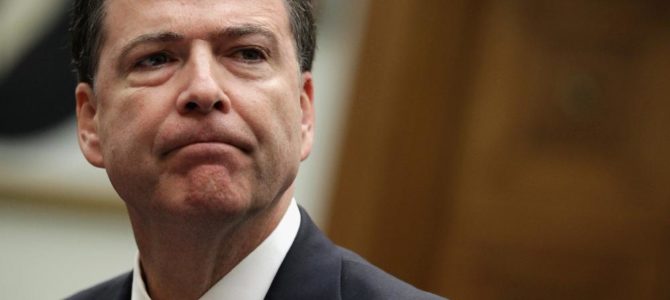Former FBI Director James Comey includes accounts of people saying nice things about him in almost every single memo he wrote about his private interactions with President Trump, to the point where they take on the feel of a teenage girl’s diary.
Dispersed among his accounts of top secret conversations with the president on national security, salacious allegations and Russian influence, and illegal leaks are detailed accounts of various people complimenting his work and defending his honor.
“After others left the room, we sat at the table,” he writes in a memo recounting his first private conversation with Trump inside Trump Tower in January, 2017. “He began by telling me that I had had one heck of a year but that I had conducted myself honorably and had a great reputation. He said I was repeatedly put in impossible positions.”
He continued: “He said you saved her [Hillary Clinton] and then they hated you for what you did later, but what choice did you have? He said he thought very highly of me and looked forward to working with me, saying he hoped I planned to say on. I assured him I intended to stay. He said good.”
Comey then went on to tell Trump the intelligence community had learned of a dossier containing allegations that Russia had a tape involving him and prostitutes, noting that he executed the conversation “exactly” as he “had planned.” Before concluding the memo, Comey adds: “He said he was grateful for the conversation, said more nice things about me and how he looks forward to working with me and we departed the room.”
In a second entry dated Jan. 28, Comey gives a multi-layered account of a dinner he had with Trump, including what they both said, and what he thought about what they said, and how that made him feel. He also is sure to note more compliments.
The President spoke an overwhelming majority of the time. He never asked me an open-ended question or left it to me to choose a topic of conversation. there were almost no periods of silence during the 1 hour and 20 minutes, except once or twice when the President paused as the servers entered. I felt comfortable throughout, although never relaxed, given the focus conversation required.
… He touched on my future at various points. The first time he asked ‘so what do you want to do,’ explaining that lots of people wanted my job (“about 20 people”), that he thought very highly of me and had heard great things, that the people of the FBI really like me, but he would understand if I wanted to walk away given all I had been through …
Before wrapping up his account, Comey again notes how loyal he is and how he was told Attorney General Jeff Sessions and Secretary of Defense Jim Mattis had complimented him.
The President then spoke again about being glad I wanted to stay. He said Mattis said great things about me, as did Sessions. He explained he had asked a lot of people about me and heard great things. He then returned to loyalty, saying ‘I need loyalty,’ I replied that he would always get honesty from me. He paused and said that’s what the wants, ‘honest loyalty.’ I replied ‘you will get that from me.’ (It is possible we understood the phrase differently, but I chose to understand it as consistent with what I had said throughout the conversation …
In another memo recounting a conversation with then-Chief of Staff Reince Priebus, Comey recounts in dramatic language how the two of them reflected on his handling of the Clinton email investigation and concluded he had done a good job and was being unfairly maligned by Clinton and her allies. Both agreed, apparently pensively, that it wasn’t his fault.
During the conversation, Reince also touched the email investigation, offering his view that the Clinton team had misplayed my final announcement and should have pushed it harder as good news. He also said, reflectively, that it wasn’t the Russians’ fault that she failed to campaign in Michigan, and it wasn’t my fault that she set up her email the way she did. He then pressed me on why it wasn’t chargeable ‘gross negligence,’ and I took him through the facts and the law. At some point I added that it also wasn’t my fault that Huma Abedin forwarded emails to Anthony Weiner.
Before wrapping up his final memo, Comey notes once more that Trump told him he was doing “great.”
“He asked me to follow up and make sure that we were working well with the Jordanians and helping them quickly bring the killer to justice,” he writes. “I told him I would. He then said that I was doing a great job and wished me well. The call ended.”








